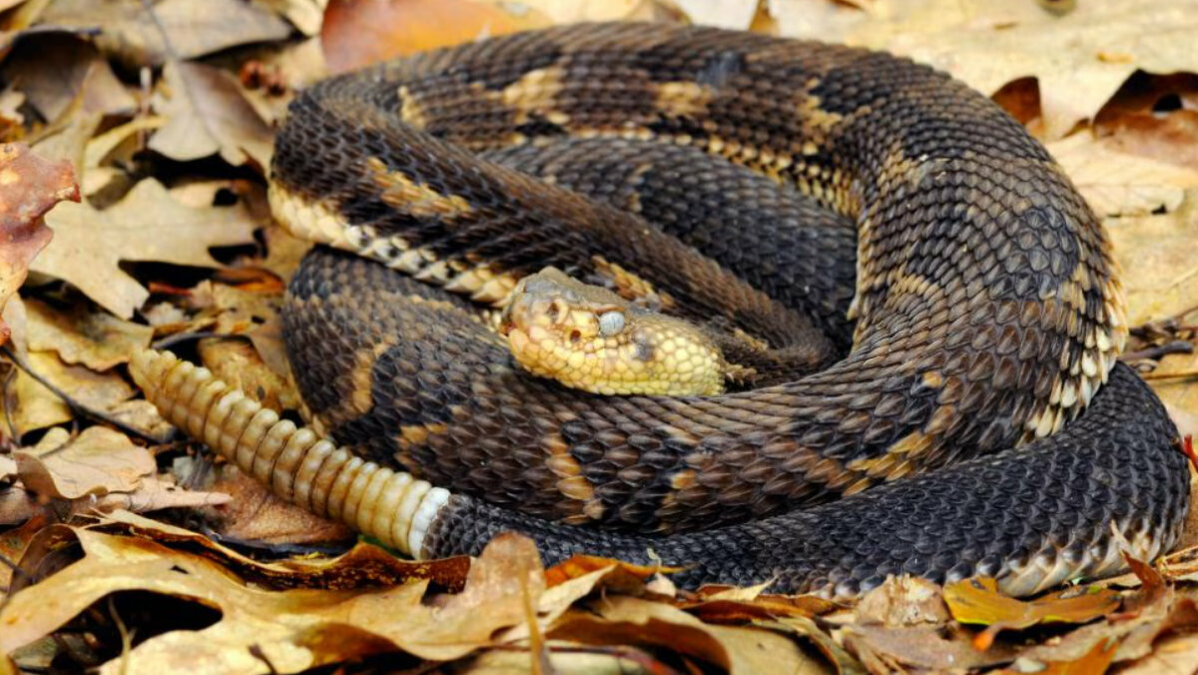
MassWildlife: FAQs About Rattlesnakes
In honor of World Snake Day on July 16, MassWildlife posted a video filmed by our State Herpetologist of a timber rattlesnake displaying its name-sake behavior of rattling the end of its tail. This video prompted many questions from Massachusetts residents about these fascinating snakes. It's clear from the popularity of the post that people are curious, so we've gathered answers to your top rattlesnake questions. Follow MassWildlife on Facebook and Instagram for more wildlife profiles, conservation stories, and tips for enjoying the great outdoors.
I have lived in MA for years and I have never seen a rattlesnake. Why not?
While rattlesnakes are native to Massachusetts, most people have never seen a rattlesnake here. Timber rattlesnakes were once widespread across western, central, and northeastern Massachusetts, but their lower reproductive rates and longer maturation period have made them highly vulnerable to many threats, leading their populations to be small and declining. Today, their statewide population is only in the hundreds and scattered over a small handful of areas, making the chance of seeing one very low. They require a specific habitat which includes mountainous terrains with steep ledges or rockslides close to forested areas with a large population of rodents. Sightings of timber rattlesnakes are also very low because they hibernate for six months of the year. They are usually active from mid-April to mid-October and rarely move or eat the first several weeks after emerging from hibernation.
We have rattlesnakes in MA?! I thought there were no venomous snakes here.
Only two of the fourteen types of snakes in Massachusetts are venomous: the timber rattlesnake and the copperhead. Both live in only a few areas of the state, and both are listed as endangered under the MA Endangered Species Act.
Timber rattlesnakes use venom to immobilize their prey, such as mice, chipmunks, squirrels, rabbits, and birds. Venom is costly for them to produce and they will only use it when needed. Both rattlesnakes and copperheads avoid people and pose no serious threat when left alone.
Learn about snakes in Massachusetts
Why do rattlesnakes rattle their tails?
When you hear a rattlesnake's rattle, it's time to skedaddle! Rattlesnakes use their rattle to warn you that they are feeling threatened and you should back away. Overall, rattlesnakes try to go unnoticed. They are sneaking up on their prey and don't want to gather attention of potential predators. They use their camouflage and low position to the ground to stay under the radar. If a rattlesnake continues to feel agitated after warning you with its rattle, they may decide to strike.
What should I do if I see a rattlesnake? How can I avoid them?
If you see a rattlesnake, the best thing to do is to maintain a safe, respectful distance. Do not handle or otherwise disturb them and continue on your way. If you aren't sure what species of snake you are looking at, treat it as though it is venomous and give it plenty of space. To avoid an encounter, make sure to stay on trails, and keep pets leashed. Because these snakes are rarely seen, please let us know if you happen to see one! Send an email with any photos (taken from a distance) and location to natural.heritage@mass.gov.
How big are rattlesnakes? What do they look like?
Adult timber rattlesnakes range from 35-60 inches long. They have a broad, triangular head and variable color patterns. Some are almost jet black. Others appear sulfur-yellow with black, brown, or rust-colored blotches, which are separated by cross bands on the back and sides. They can sometimes be confused for Northern watersnakes and milksnakes.
Why are rattlesnakes endangered? What is being done to conserve them?
Threats to timber rattlesnakes include habitat loss and fragmentation, road mortality, targeted and incidental killing, collection, harassment, and fungal disease. It is illegal for anyone to kill, collect, possess, import, or move rattlesnakes in Massachusetts.?MassWildlife is actively working to conserve rattlesnakes in Massachusetts through land protection, monitoring, habitat management, road mortality reduction, and public education. You can report sightings of rattlesnakes to MassWildlife at?natural.heritage@mass.gov, or report any suspected illegal activity directly to the Massachusetts Environmental Police at 1-800-632-8075.
Tags: MassWildlife, snakes,















